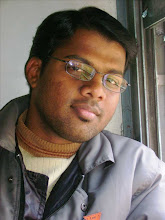I want to give a huge write up… my complete experience. It was a roller coaster ride and I don’t want to miss a moment of happiness. I just have one question; if I do a write-up for 10000+ words will anyone sue me…???
I still wonder how I made this trekking possible with my big tummy… but yeah, that was the truth. Skandagiri hills, 75km from Bangalore, one of the finest things to trek. I enjoyed a lot and I have had a fresh breath on the hill top. My soul, mind got fresh new thoughts after climbing for hours to reach the top.
We were 21 of us and started from majestic bus stop, Bangalore at 9 in the night and reached to Skandagiri hills at around 11.30am. It was good because of moonlight. The moon was in a little oval shape and the dim light from it was so pleasant to walk under. We started walking towards the hill top. People were crawling, talking, making funny sounds every now and then we take rest to make up ourself for the rest of the trekking.
We were walking through giant rocks, dark bushes but some how we had a torch light which helped us. Some times, you could see a steep way and some times rocky and bushy path way. Did not actually miss anything above!! We went out for gazing at the clear sky with thousands beautiful twinkling stars.. My friends were explaining to me the constellation. I was listening to them and trying to understand at one moment and at the same time I was just wondering about the next day.
What’s special about climbing the mountain/hill? There’s nothing special you can find here until you experience by yourself but few things I can say here
- Good exercise to your physical body
- You will get fresh thoughts in your mind and soul
- You will simply enjoy the beauty of nature even though you experience physical pain.
After reaching to hill top, we started eating buns, oranges, tea and what ever have had.
Rajesh was the one first initially brought sticks and stuff for bonfire, after some time I was able to bring some and added to it. You know, its very difficult to make fire on hill top because you might experience heavy cold breeze in the early morning, but some how we were able to do it and made crazy sounds and enjoyed few minutes..
Then we were waiting for the sun rise, sun became shy I think because of we waiting for his appearance without sleeping. After some time, his shyness gone away and he made his appearance and little bit hiding behind the dew like the young girls do hide behind their mother, but some how I was able to capture the beauty in him.
Another good thing you can notice on hill top is that tea shop. They provide tea, bread, omlet and bajji etc… skandagiri hills is a business opportunity too…!! I can see a little entrepreneur there selling a tea.
I can say there are about 200 people on hill top in the early morning as light came, I can see the crowds. You can even see a temple on the hill top(Don’t ask me about god..!!).
After some time, we started coming down and I was wondering that I have walked via these path way and bushes in the moon light without any fear. Walking back was not difficult in fact my pace increased or maybe that’s the way it is. I forgot to get some snaps… was dealing a lot with fatigue and recovery and enjoying the last trails.
All I had in my mind is to reach to (hill) top and experience the diverse mode of sun rise. That kind of confidence is what I got now.
